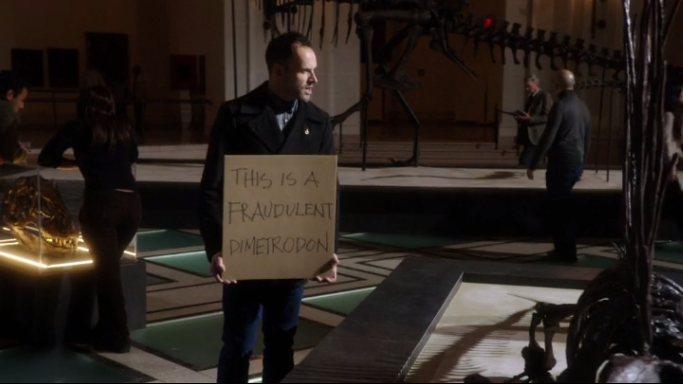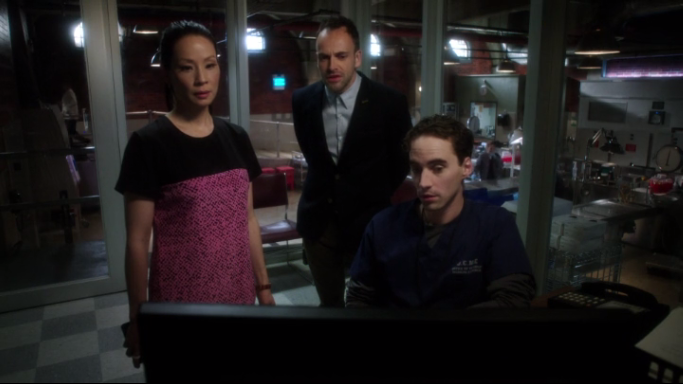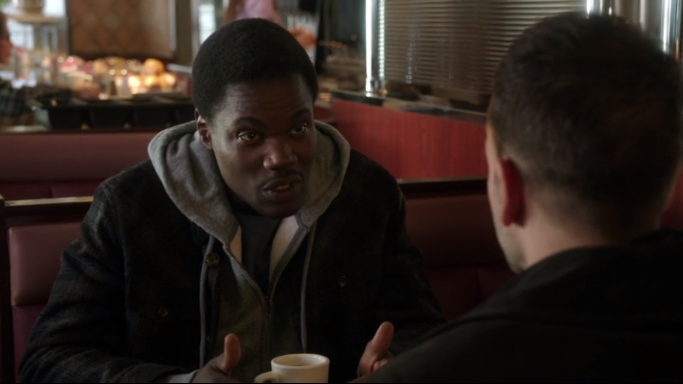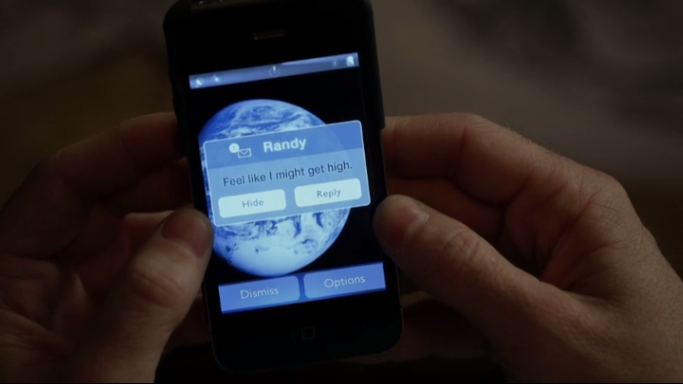Elementary Recap: S02E14, “Dead Clade Walking”
Warning, contains spoilers for previous episodes in seasons one and two.
‘Elementary’ Recap – Dead Clade Walking
Sherlock’s quirky hobby of the week is trepanning (“drilling holes into peoples’ skulls” for those who didn’t read His Dark Materials voraciously as a child), but he’s constantly and concernedly interrupted by texts from his new mentee, Randy, who’s having trouble staying away from relapse triggers. On his way to see Randy, he runs into Gaye, a geologist who’s helping Joan investigate a lead in one of his cold cases. (There’s also a joke about her name which wasn’t particularly funny or relevant to the plot in any way.) Joan had noticed a large, strange rock at the scene of the murder of Doug Newburg, which she and Gaye go to investigate. While they examine the rock, Sherlock takes Randy to a meeting and listens uncomfortably to Randy’s concerns.
Randy’s ex Eve (again, names, jokes, irrelevant) recently returned to NYC and “wants to get clean,” asking if she can live with him. Randy’s not sure if he could resist using with her there, so Sherlock, out of his element, advises Randy to rebuff Eve even if it seems cruel– Randy’s sobriety being paramount. At the crime scene, Gaye identifies the rock as marine limestone cut from an archaeological dig; meaning there might be a fossil inside.
Taking the (stolen) rock to be scanned Sherlock and Joan discover there’s a tiny T-Rex fossil inside. They consult Jerry Thomas, fossil curator and finder of the world’s only complete Dimetrodon skeleton, who confirms it’s a real nano-Tyrannus, incredibly rare, probably dug up in Mongolia and, with it being a complete skeleton, worth around $10-million. So how did a smuggled fossil end up in the backyard of average Doug Newburg? Sherlock deduces it must have been someone Doug knew well.
Randy is unable to cut Eve out of his life and comes again to Sherlock, still uncomfortable with discussing romantic entanglements considering his own inability to give up Moriarty. Sherlock now struggles with being “partially responsible” for an addict’s continued well-being. Does he remain firm in his assertion that he is “not a therapist” to Randy and risk his mentee relapsing without someone to talk to? Or does he give up a personal boundary for the continued sobriety of someone with whom he cannot help but empathize?
Elementary‘s exploration of crossing and defining interpersonal boundaries– first in the professional realm with Sherlock and Joan, then professionally as they became friends and equals; then Sherlock’s relationships with drugs and Irene/Moriarty; Joan’s relationship with her family and romantic pursuits; Sherlock’s relationship with the NYPD and Bell– has always been the show’s most humane and intriguing element, especially with how Sherlock’s addiction and path through sobriety are used as a device. For anyone who’s ever had to help a loved one through addiction, sickness, depression, grief, or any sort of prolonged pain, especially one that is self-afflicted, watching Johnny Lee Miller handle the question of where Sherlock’s responsibility begins and ends is poignant and familiar.
Joan discovered that Diego Salcedo, Doug’s close friend, has been running a black market smuggling operation out of ice cream trucks, and Gregston prepares a sting to catch him in the act. He admits to giving Doug the rock but swears he isn’t the murderer. Sherlock wants to put the skeleton back on the black market to try and drum up the suspects who would have had a reason to kill for it the first time around– only it’s been stolen, right from the NYPD office.
Sherlock consults his penpal “C,” who works in a high-end auction house, and finds out that the name in town when it comes to the rare and expensive in black-market goods is “The Magpie,” who only gets it touch when you have something he wants. Sherlock decides then to fake owning a copy of Martin Luther’s 95 Theses rough draft, and is invited via email to meet with the Magpie in his home. Unfortunately when he and Joan get there, the man has been murdered– the nano-Tyrannus smashed to pieces on the floor beside him.
Tired of constantly having the threat of Randy’s relapse dragging him out of bed and into uncomfortable, repetitive conversations, Sherlock snaps and tells Randy that he’s already said his piece– Eve will be a bad influence. No matter how many times Randy comes to him waffling about whether it’s wrong to cut her out of his life, his advice will not change. Randy abandons him at a diner, not returning any of Sherlock’s texts.
Curious about why the murderer would destroy a million-dollar rock, Sherlock re-consults Gaye and discovers that the nano-Tyrannus fossil was not only worth a lot but was, in fact, controversial proof of an archaeological theory called “Dead Clade Walking” that suggested some species of dinosaurs survived the widespread meteor extinction. If brought to light, archaeologists who had based their whole careers on refuting the theory would lose credibility, and possibly their jobs. Joan and Sherlock collect the biggest opponents to “Dead Clade Walking” and ask them to submit to a DNA test to be compared to that left at the scene of both crimes. Sure enough, one matches– Professor Andrew Donnelly. Unfortunately their suspect is both in a wheelchair and has an air-tight alibi for the Magpie’s murder. Then how did his DNA get to the scene of the crime?
Revisiting the Magpie’s ledger of sales, they realize that the purchaser nicknamed “Snipes Hoolihan” has purchased several dinosaur bones– an arm, a toe, and part of a spine– from a creature labeled “D’d.” Realizing that this creature is Jerome Thomas’ “complete” Dimetrodon, and that Terry co-wrote a famous textbook with Donnelly, the consultants confront him at the museum and convince him to confess for a more lenient sentence.

Randy finally makes a reappearance and admits that Sherlock was right– Eve led him to a relapse. Sherlock’s hard-sell method of mentorship was not enough to keep Randy from relapsing, even if he did end his relationship with Eve the next morning. Sherlock confirms that he is still Randy’s mentor, and takes him to a meeting.
What did you think of the episode? What challenges lie ahead for Sherlock as he continues to navigate his mentorship? When’s the next Clyde appearance? We’d love to hear your thoughts in the comments!




